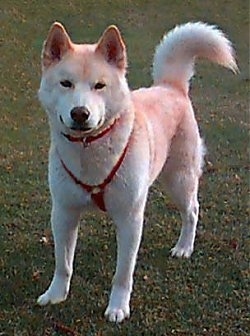 ORIGIN : Japan.
ORIGIN : Japan.
UTILIZATION : Hunting dog, companion.
FCI CLASSIFICATION : Group 5 : Spitz and primitive type
Section 5 : Asian Spitz and related breeds
Without working trial.
BRIEF HISTORICAL SUMMARY : This breed is said to have originated from medium-sized Japanese dogs that accompanied migrants from Honshu (the main island of Japan) to Hokkaido during the Kamakura era (in the 1140s), when exchanges were developing between Hokkaido and the Tohoku District. When the breed was designated as a "natural monument" in 1937, it took on the name of the area. It also came to be known as the "Ainu-ken", since the Ainu-the former inhabitants of Hokkaido-used to breed these dogs for hunting bears and other animals.
The physique of the Hokkaido enables it to withstand severe cold and haevy snowfalls. It also shows accurate judgement and great stamina.
GENERAL APPEARANCE : Medium-sized dog with secondary sex characteristics strongly marked, well balanced, sturdily built and well boned. Muscles tough and clean cut.
IMPORTANT PROPORTIONS : The ratio of height at withers to length of body is 10 : 11.
The ratio of skull length to length of nasal bridge is 3 : 2.
Length of skull equal to width of cheeks, being about one fourth of height at withers.
BEHAVIOUR/TEMPERAMENT : Dog of noteworthy endurance, showing dignity and naive feeling. The temperament is faithful, docile, very alert and bold.
HEAD
CRANIAL REGION :
Skull and forehead : Broad and slightly flat.
Stop : Shallow, but defined.
FACIAL REGION :
Nose : Black, flesh colour permitted with a white coat. Nasal bridge straight.
Muzzle : Wedge-shaped.
Lips : Tight, with black edges.
Teeth : Strong, with a scissor bite.
Cheeks : Well developed.
Eyes : Relatively small, nearly triangular, set well apart and dark brown in colour.
Ears : Small, triangular, slightly inclining forward and firmly pricked.
NECK : Powerful and muscular, free from dewlap.
BODY :
Withers : High.
Back : Straight and strong.
Loins : Moderately broad and muscular.
Croup : Properly sloping.
Chest : Forechest well developed. Chest deep and moderately broad; ribs well sprung.
Belly : Well drawn up.
Tail : Set on high, thick and carried over the back vigorously curled or curved like a sickle, the tip nearly reaching hocks when let down.
FOREQUARTERS :
Shoulders : Moderately sloping.
Forearm : Straight, clean ut.
Pasterns : Slightly inclining.
HINDQUARTERS : Powerful.
Hocks : Tough, sufficiently strong.
FEET : Toes well arched and tightly closed; pads hard and elastic; nails hard and black or dark colour.
GAIT : Active, quick, light and resilient.
COAT :
HAIR : Outer coat harsh and straight; undercoat soft and dense. The hair on the tail fairly long and off-standing.
COLOUR : Sesame, brindle, red, black, black and tan, white.
SIZE :
Height at withers : Dogs 48,5 - 51,5 cm
Bitches 45,5 - 48,5 cm
FAULTS : Any departure from the foregoing points should be considered as a fault and the seriousness with which the fault should be regarded should be in exact proportion to its degree.
- Slightly overshot or undershot mouth.
- Bitchy dogs/doggy bitches.
DISQUALIFYING FAULTS :
- Extremely overshot or undershot mouth.
- Ears not pricked.
- Hanging or short tail.
- Shyness.
N.B. :
Male animals should have two apparently normal testicles fully descended into the scrotum.
Blue-black colour in tongue is not considered as a fault.